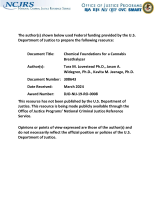Which Matters Most? Demographic, Neuropsychological, Personality, and Situational Factors in Long-Term Marijuana and Alcohol Trajectories for Justice-Involved Male Youth
Journal
Psychology of Addictive Behaviors
Date Published
2015
Agencies
NIJ-Sponsored
Publication Type
Research (Applied/Empirical)



